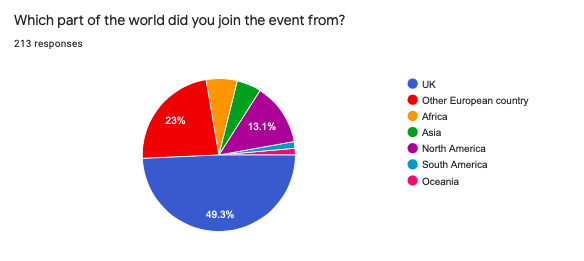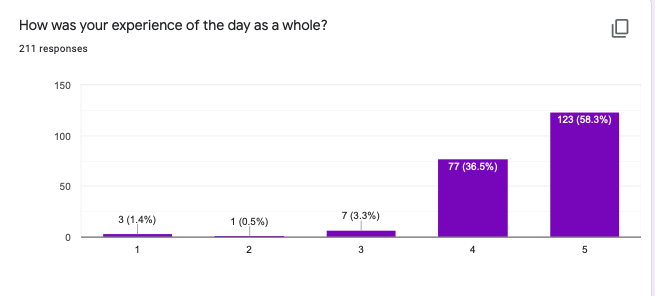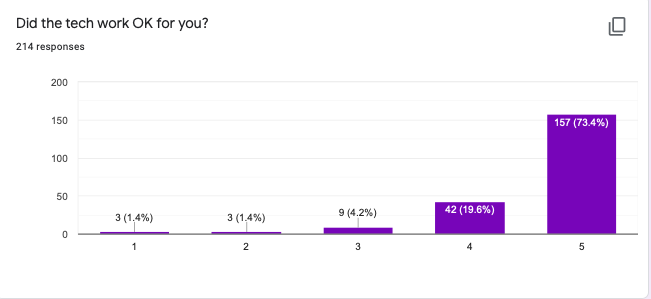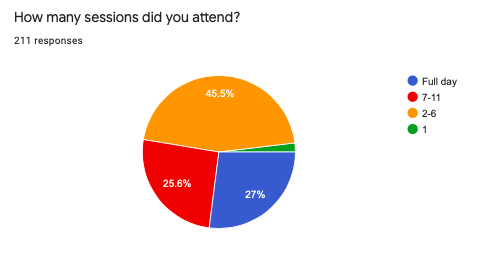FOSS4GUK 2020 Online - Lessons Learnt
This is a draft at the moment!
Summary
FOSS4GUK 2020 Online was hosted by the OSGeo:UK committee on 17th June 2020 from 9.00am to 17.30pm UTC+1
The event was free to attend with all of the costs (see below) funded from OSGeo:UK reserves.
Delegates
- 1,000 people registered
- We estimate that between 500 and 600 attended
- Maximum number online at any time was 460, minimum was 205
- Delegates from 77 countries
- 48% from GB, 8% US, 4% India
Programme
- 3 streams running for the whole day (except during keynotes)
- 2 keynotes
- 29 talks and demos
- 4 Lightning talks
- 38 Speakers (10 women)
- Coffee bar stream where delegates could hang out and chat (not heavily used)
Finances
- The only costs were the fees for the zoom account for 1 month: £198
- Delegate donations:
- OSGeo:UK 63 individual donations - gross £1,810, net after Paypal fees £1,744 (as of 2020-06-20)
- MapAction c. £600
Feedback
As of 2020-06-22 we had 210 feedback responses:
- 95% rated the event experience very good or excellent
- 93% were happy with the technology platform
- 27% attended for the whole day, 27% attended 7-11 sessions, 45% attended 2-6 sessions
- 16% used the coffee bar
- 47% of respondents (but not attendees) made a donation to OSGeo:UK (34%) or MapAction (13%). The average donation was ca £20
Tech and tools
Choice of video conferencing platform
We considered
- webex (we had an offer of a free account from a 'sponsor') - during a test we encountered problems with audio, uncertain linux support, and a possible limit on numbers
- hopin.to - a virtual conference application, unfortunately the demo we attended was not successful and we did not feel comfortable taking the risk on a new service, but it looks promising for the future
- several other services that did not seem to fit our needs
- jitsi - our experience of using the free hosted version left us uncomfortable with jitsi as platform for a large event with 3 streams. None of us had the experience or access to hardware and bandwidth to consider running a large self-hosted version of jitsi. We were also concerned about how we could control access or restrict anyone breaching our CoC
- several of us had experience of running large meetings on Zoom and were confident that we could host the event on zoom and leverage it's capabilities.
What we learnt
- Zoom worked as anticipated. We had no major technical problems and as far as we know very few participants experienced problems. Zoom offers clients for Linux, Mac and Windows, iOS and Android and we did find that there were some minor functional differences between the proprietary OS software and open OS app.
- We were able to manage participants by muting everyone on entry and restricting chat within the app to messages to one of the hosts and from the hosts to the whole audience.
- The recording worked well, a co-host was asked to remind the host to start and stop the recording for each session to keep videos at a manageable size
- We saved all of the chat transcripts as part of our CoC policy (fortunately unnecessary)
We purchased:
- 1 account for up to 1,000 people for the keynotes
- 2 accounts for up to 500 people for the other streams
- 1 account for up to 100 people for the coffee bar
- An add on for large cloud storage for all of the video recordings
- Total cost £198 (a month's licenses)
We over-provisioned because we did not know how many people would actually log-in. We could have managed with smaller accounts and saved some money.
It is unclear whether we would have been better off purchasing zoom webinar licenses rather than large meetings.
We were aware that the Zoom meetings could have been streamed to YouTube but we did not see any significant benefit from doing that. In fact it could have pulled attendees away from the main conference.
Options for the future
We have received some retrospective suggestions for alternative tech approaches to running an online event. Hopefully others will be inspired to run further online FOSS4G events and they will experiment with these.
Our choices were based on a need for a low effort tech approach given our small team and pressures on our time. Despite the poor publicity that Zoom had received re security during the COVID crisis we found that the security features available were sufficient for our needs.
Eventbrite
We used eventbrite for our registration system.
- It was free as the event was a free event, if we had charged £10 per registration we would have incurred cost including credit card fees of about 10%
- Eventbrite has an online event page which is only accessible to people who have registered, we only exposed the links to the conference streams via this page to minimise the risks of being overloaded or trolled.
- We added a registration question to request permission to add registrants to the global FOSS4G mailing list (we had a very high acceptance rate). This should be highly recommended practice for future FOSS4Gs
- We made the completion of a company address mandatory on registration because it forced people to provide their 2 digit country code which enabled us to analyse the locations of registrants. This will enable future FOSS4G to geographically segment the audience.
- We used the attendee mailing features to send a a series of emails to participants in the build up and post event. Its a bit clunky but it works fine and avoided having to maintain an alternative email list.
WhatsAppp
We used WhatsApp for team communications in the build up and on the day. We also had a group for our volunteers and were able to share updates with the volunteers before the event and it was the main channel of communication on the day
We could have considered a speakers group in addition.
We used Twitter as our main channel for publicity prior to the event. It is important to recognise that not everyone is on Twitter, and future events should consider what other channels to use for communication with potential participants. One or two posts were replicated on LinkedIn but there are no statistics to show how many attendees signed up because of this.
We used Twitter on the day for announcements, publicity and encouraged the participants to chat via Twitter.
Event organisation
- The event team was the 6 members of the OSGeo:UK organising committee we held our first call to discuss the event on 2020-04-13.
- We hosted our event website on the OSGeo:UK site at GitHub.
- We used Google forms for the call for papers and for a request for volunteers
Hosts and co-hosts
- For each stream of the event we had a host (one of the organising team + Nick Bearman) and co-host (volunteers).
- The Host Guide provided detailed guidance for hosts and co-hosts on how to run the session on Zoom, detailed settings and what to do in the event of a code of conduct violation or other issue. This doc evolved as we ran a couple of trial sessions with volunteers.
- We recruited volunteers in the initial stages, though about half of those who put themselves forward dropped out or didn't respond later in the process. The main task for volunteering was co-hosting.
- Because of a shortage of volunteers, we targeted people we knew to recruit the last three or so, and we had one reserve who wasn't required.
- We held a couple of briefing/test sessions for all volunteers on Zoom, and this also enabled us to get to know them a bit as well as test their tech.
- On the day, the co-hosts were effectively 'reserve hosts', and on a few occasions, had to step in because the host had connection or other issues.
Recording and publishing
- We asked hosts to start the recording before introducing the speaker and to stop the recording after questions. This created a separate recording for each speaker and made it a lot easier for the video team.
- It's easy to forget to start/stop the recordings so we asked the co-hosts to remind the hosts
- We purchased a large amount of cloud storage for recordings in preference to each host recording locally. This enabled the volunteers post-processing the video to access all of the recordings in one place.
- Our video volunteers topped and tailed each recording with an intro slide and closing slide
- Video was uploaded to the FOSS4GUK YouTube on 2020-06-23 and is linked from the programme on the website where we also linked to the slides where provided.
What worked
- We kept to schedule throughout the day.
- The 10 minute gaps between sessions stopped the day being too frantic.
- We kept the 4 streams open for the whole day and swapped hosts to give everyone a break. This avoided having to share login details and seemed to work well.
- Zoom proved to be adequate for our requirements, we had no trolling or security issues.
- Speakers seemed happy presenting on Zoom although most commented that presenting to a screen was very different to being in front of an audience.
- Restricting the chat to "participants to hosts only" prevented too much distraction.
- Hosts received questions via chat and asked them on behalf of participants, this enabled us to get through more questions than if we had virtually "handed the mike" to the questioners. We think it also encouraged some less confident people (and those for whom English is a second language) to ask questions.
- Co-hosts were available as backup to hosts, able to step in if needed (which it was in some cases).
- The volunteers were from a range of locations, and a number hadn't been involved in FOSS4G before - so it was a great way to introduce new people.
- We kept the website simple (in Markdown on the OSGeo:UK site) and manually updated, with no app. This made it easy to update through the lifecycle of the conference, adding links to slides and recordings.
- Hosting the recordings on a dedicated FOSS4G UK channel.
- Having a bulleted 'script' for the hosts to work through for each session helped us to remember what needed to be done (e.g. thanking speakers etc).
What didn't work so well
- A tiny number of people did not get the link info via the eventbrite website for reasons that we don't understand (spam filters possibly) - if they mailed us we provided the link info to them directly.
- The coffee bar was not heavily used (but the feedback about it was reasonably positive)
- Restricting the chat to "participants to hosts only" prevented interaction between delegates during and after the talk
- We had a high level of no-shows. A free sign-up encourages no shows but we wanted to make the event as accessible as possible.
- We had a low proportion of voluntary donations (<20%)
- Some people would have preferred there to be a lunch break. This might have been an opportunity to encourage people to try out the coffee bar. But with the audiance being global we also needed to maximise the time spent online.
- In the end we were a bit short of volunteers, and had to strongarm some friends to step in - this was a shame, as it was a great opportunity for new people to get involved. We should perhaps been more specific with the requirements (i.e. co-hosting), and pushed the volunteering a bit more - it seemed we were OK, but the dropout rate was about 50%
What would we try to do if we ran another event?
- Consider a policy for using WhatsApp messaging (or other - Signal?) during live sessions as notification alerts can be heard in some videos. This is not a major thing, but it could be distracting for hosts and speakers.
- Consider increasing speaker diversity. A general call went out, and we were reliant on those who engaged from the community but perhaps more could be done in future to increase all forms of diversity.
- Some form of interactive social component is required. This was attempted with the coffee stream and Twitter on the day, but this needs some consideration as feedback suggests that delegates wanted more socialising (difficult, but not impossible).
- Where many questions were being asked, it would be nice to move the speaker (and those who wanted to discuss the presentation topic further) into the coffee stream to carry on the chat (as happens at in-person events).



